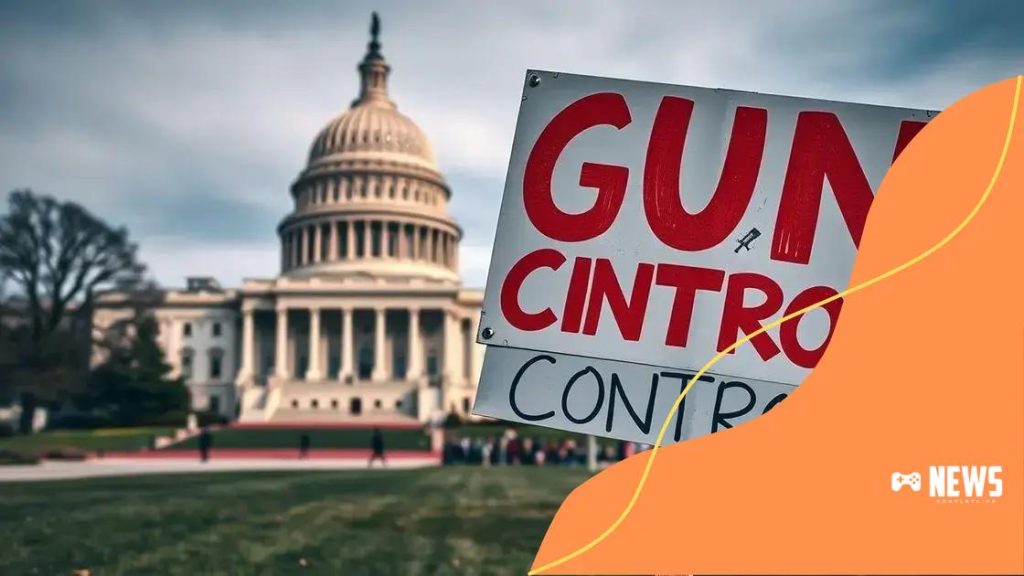Gun control legislation debates in Congress: what’s at stake?

Gun control legislation in Congress involves ongoing debates characterized by diverging public opinions, advocacy group influences, and recent legislative changes aimed at balancing public safety with individual rights.
Gun control legislation debates in Congress have become increasingly intense, capturing the attention of citizens. What does this mean for our safety and rights? Let’s delve into the complexities.
The history of gun control legislation
The history of gun control legislation in the United States is a complex journey filled with significant events and societal changes. Over the years, laws have evolved in response to public safety concerns, political developments, and shifting cultural attitudes towards firearms.
Early Legislation
Initially, gun laws were quite lax, with few regulations governing ownership and use. However, as the nation grew and violence increased, the need for gun control became evident. One of the earliest laws was the National Firearms Act of 1934, which aimed to regulate machine guns and short-barreled rifles.
1980s and Beyond
During the 1980s, the conversation surrounding gun control gained momentum. The assassination attempt on President Ronald Reagan in 1981, which injured several others, reignited the debate. Advocacy groups sprung up, pushing for stricter regulations.
- Formation of gun control advocacy groups
- Influence of high-profile shootings
- Introduction of background checks
In 1993, the Brady Handgun Violence Prevention Act was passed, mandating background checks for gun purchases from licensed dealers. This marked a significant step towards more comprehensive gun control measures.
21st Century Developments
In the 21st century, the tragedies of shootings in schools, places of worship, and public spaces further fueled the gun control legislation debates. Events like the Sandy Hook Elementary School shooting in 2012 intensified calls for reform.
As a result, several states began to adopt measures such as red flag laws and assault weapon bans. The patchwork of laws across different states illustrates the ongoing struggle between gun rights and public safety.
Ultimately, the history of gun control legislation is not just about laws; it reflects the values and priorities of our society. The challenge remains in finding a balance that respects individual rights while ensuring the safety of communities.
Key players in Congress and their positions
Key players in Congress play a significant role in shaping the discussion around gun control legislation. Their varying positions and influence can determine what laws are proposed, debated, or enacted.
Political Leaders and Their Roles
Members of Congress come from diverse backgrounds, impacting their views on gun control. Leaders such as the Speaker of the House and Senate Majority Leader often guide their party’s strategy on this critical issue. Their stance can mobilize support or opposition among other legislators.
For instance, when the majority party prioritizes specific legislation, it often reflects the beliefs of key figures. A Speaker who supports strict gun laws may push for comprehensive reforms, while a leader opposed to such measures might stall related bills.
Prominent Senators and Representatives
Several senators and representatives are especially vocal about gun control. Figures like Senator Dianne Feinstein and Representative Chris Murphy have championed stricter regulations, pushing for background checks and assault weapon bans.
- Senator Dianne Feinstein – Advocate for assault weapon bans.
- Representative Chris Murphy – Known for advocacy after tragic shootings.
- Senator Marco Rubio – Often supports gun rights and opposes strict regulations.
On the other side, members like Senator Ted Cruz champion gun rights, arguing that regulations infringe on the Second Amendment. These differing viewpoints create a dynamic and sometimes contentious atmosphere in Congress.
The influence of special interest groups, such as the National Rifle Association (NRA), also shapes the positions of many legislators. When key players prioritize their agendas, it can overshadow public opinion, which often favors more restrictions.
The ongoing debates in Congress reflect more than mere political positions; they showcase the broader societal conflict over gun control. Understanding the key players helps us grasp how laws might evolve in the future.
Public opinion on gun control laws

Public opinion on gun control laws varies widely across the United States. Understanding what people think can help us gauge the direction of future legislation. Polls repeatedly show that a significant portion of the population supports some form of gun control.
Survey Results
Recent surveys indicate strong support for background checks for all gun purchases. Many Americans believe these measures are essential for enhancing public safety.
- Approximately 90% support universal background checks.
- A majority favors restrictions on assault weapons.
- Public sentiment often shifts in response to mass shooting events.
This strong backing for background checks reflects a deep concern for safety and a desire for responsible gun ownership. However, there is a notable divide in opinions based on political affiliation. Democrats typically advocate for more stringent regulations, while Republicans often emphasize Second Amendment rights.
Influencing Factors
Several factors influence public perception of gun control. Media coverage of gun violence plays a crucial role in shaping views. After high-profile shootings, people often rally for stricter laws. Social media campaigns and grassroots movements also contribute to ongoing discussions about firearm regulations.
Additionally, regional differences can be significant. In areas with high gun violence rates, residents may strongly support gun control laws, while those in rural regions might prioritize the right to bear arms.
As we see fluctuating public opinion, it’s essential to recognize how these views can impact legislation. Policymakers often take note of polling data when deciding how to approach the gun control debate.
Recent changes in legislation
Recent changes in gun control legislation reflect evolving public attitudes and the impact of high-profile incidents. These changes showcase how lawmakers respond to the pressing demands of their constituents and the ongoing debate over gun rights.
New Laws and Proposals
In the last few years, several states have enacted stricter gun control measures. For example, after a series of tragic mass shootings, states like California and New York passed laws that include expanded background checks and restrictions on high-capacity magazines.
- California implemented a ban on the sale of certain assault weapons.
- New York introduced legislation aimed at preventing gun violence through mental health assessments.
- Several states adopted red flag laws to temporarily remove firearms from individuals deemed a threat.
These legislative actions indicate a growing trend among lawmakers to prioritize public safety by addressing issues related to firearm access.
Debates and Challenges
While some states are making progress, others are pushing back against gun control measures. In many regions, strong gun rights advocacy groups, such as the National Rifle Association (NRA), actively oppose changes perceived as restrictive.
Moreover, the political landscape significantly affects these discussions. Lawmakers often face pressure from both sides, making it challenging to reach consensus. This tension results in ongoing debates about the balance between gun rights and public safety.
In Congress, discussions about comprehensive reforms continue, but progress is often hindered by partisanship. Proposed bills addressing issues like universal background checks face an uphill battle, reflecting the divided opinions among legislators.
As society navigates these complex issues, the discussion around gun control legislation remains relevant and critical, demonstrating the need for ongoing engagement and understanding of these evolving laws.
Future prospects for gun control debates
The future prospects for gun control debates in the United States remain uncertain yet pivotal. As societal concerns around safety grow, discussions about regulations are likely to intensify. The ongoing dialogue reflects deep divisions among lawmakers and the public regarding the balance between rights and safety.
Changing Public Sentiments
In recent years, public opinion has shown a shift towards supporting more stringent gun control measures. High-profile incidents of gun violence often catalyze these discussions, prompting citizens to express their concerns to lawmakers.
- Surveys show increasing support for universal background checks.
- Many Americans advocate for bans on certain types of firearms.
- The demand for greater accountability for gun owners is rising.
As more citizens voice their opinions, elected officials may feel more pressure to respond with meaningful legislation.
The Role of Advocacy Groups
Advocacy groups will continue to play a significant role in shaping future debates. Organizations that promote gun rights and groups that advocate for gun control will influence public policy and legislative agendas.
Funding and mobilization efforts by these groups can dramatically alter the political landscape. They work to sway public opinion through educational campaigns, lobbying efforts, and grassroots mobilizations.
Legislative Developments
Looking ahead, it is clear that the legislative landscape will be dynamic. Proposed bills addressing gun control regulations may face significant hurdles due to partisan divides. Even when support is evident in public opinion, passing laws can be challenging.
Moreover, the judicial system also plays a role in determining the future of gun control. Supreme Court rulings can establish legal precedents that either support or hinder new legislation.
The future of gun control debates will rely on how well both sides can articulate their views and connect with the public’s concerns. As issues of safety, rights, and responsibilities intersect, expect debates to become more prominent in national conversations.
In conclusion, the debate over gun control in the United States reflects a complex intersection of safety, rights, and societal values. As public opinion continues to evolve, so do the responses from legislators and advocacy groups. The future will likely see ongoing discussions as individuals and communities navigate their differing perspectives on firearms. Ultimately, finding a balance between the right to bear arms and ensuring public safety remains an essential challenge for society.
FAQ – Frequently Asked Questions about Gun Control Legislation
What are the key factors influencing gun control debates?
Key factors include public opinion, high-profile incidents of gun violence, and the influence of advocacy groups on legislation.
How has public opinion changed regarding gun control in recent years?
Recent surveys indicate increasing support for measures like universal background checks and bans on assault weapons.
What role do advocacy groups play in gun control discussions?
Advocacy groups mobilize public support and lobby Congress to influence gun control policies, representing both pro-gun rights and gun control perspectives.
What future trends can we expect in gun control legislation?
Future trends may include more state-level regulations, ongoing debates in Congress, and potential changes influenced by public opinion and advocacy efforts.





